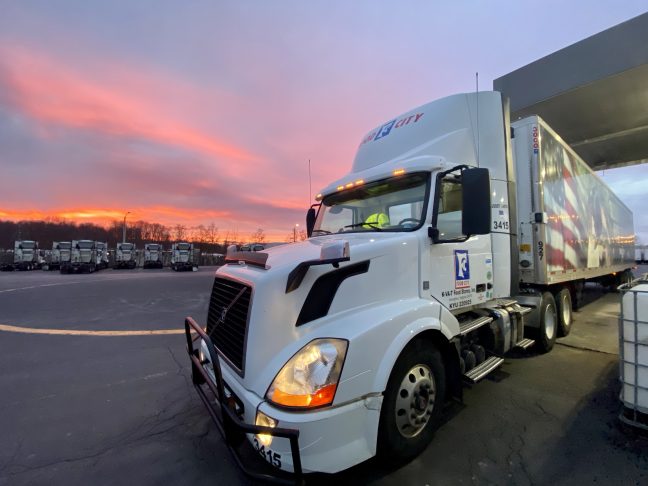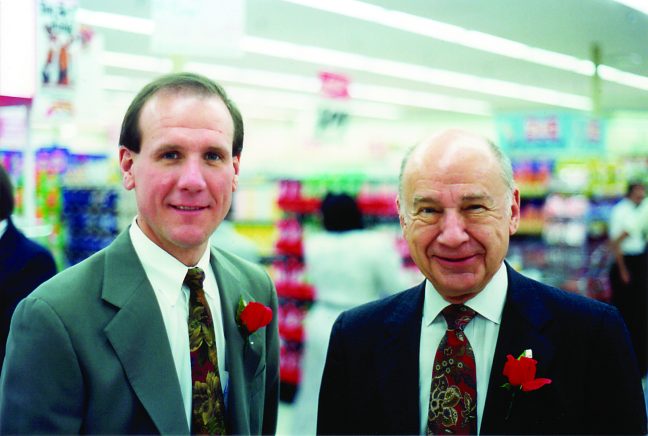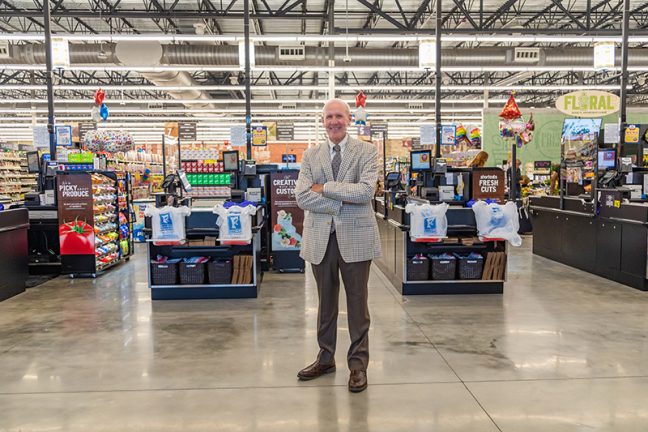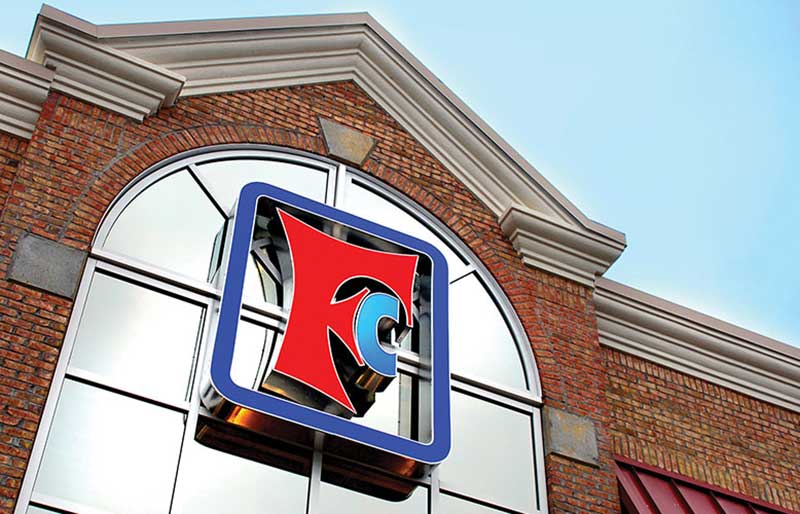From Virginia mountains, Food City evolves into regional leader
Food City, The Shelby Report of the Southeast’s 2023 Retailer of the Year, has grown exponentially over the years through acquisition and natural growth. The privately held, family-owned company began as an 800-square-foot Piggly Wiggly in Grundy, Virginia, according to Steven C. Smith, president and CEO.
Food City was also previously named The Shelby Report of the Southeast’s 2016 Retailer of the Year.
Today, Food City’s parent company, K-VA-T Food Stores Inc., operates 17 locations in southeastern Kentucky, 24 in southwest Virginia, 97 in east Tennessee, 11 in north Georgia and a single store in Alabama, where another location is under construction and more are planned.

The Food City banner includes 119 pharmacies and 116 fuel/convenience stores. Alongside its flagship banner, K-VA-T Food Stores operates five Fresh n’ Lows and one Cooke’s Food Store and Pharmacy locations, four Super Dollar Food Center limited assortment stores, four wine and spirit stores and six Curt’s Ace Hardware stores.
The company also operates a 1.2 million-square-foot distribution center that also produces Misty Mountain Spring Water. The DC and K-VA-T Food Stores are headquartered in Abingdon, Virginia. The distribution center handles the delivery of all perishables to every Food City location. The bottling plant bottles pure spring water for sale in Food City locations, as well as private label water for a number of retailers, according to Greg Sparks, SVP/COO.
The company is dedicated to giving back to its associates and the communities where it operates. Nearly 40 years ago, Food City began offering an employee stock ownership plan. Today, more than 12 percent of the company is owned by associates through the profit-sharing program. That includes about 10,000 associates, or almost 60 percent of associates, Sparks said.
Second-generation owner Smith explained this change came from the company’s founder and his late father, Jack C. Smith.
“I don’t know too many good grocers that aren’t nice people and aren’t friendly people. That’s part of what you need to be a good grocer,” he said. “And you care about your communities, you care about your associates. Because it’s not me or anybody else in leadership positions that make the company good. It’s the people in the stores that care about taking care of their customers that really make a successful company.
“Back in the early ‘80s, my dad really understood that. He wanted to do something to solidify a relationship with our customers and our associates.”
The ESOP comes at no cost to qualifying employees as part of the company’s retirement program. Smith said he considers this type of dedication to the people – within and outside the company – Food City’s “secret sauce.”
Family history
The Smith family began the journey into the grocery industry in 1955. Jack Smith opened his first store after spending seven years in the U.S. Navy where he served as a supply officer.
“He learned logistics, he learned leadership and learned management by doing that,” Steve Smith said.

While preparing for the holidays, the elder Smith made a trip to a grocery store, where he had to wait 30 minutes to check out.
“He said, ‘I think I can do this better,’” Smith said with a laugh.
Jack Smith left the Navy in 1954 and he, along with his father, Curtis, cousin Ernest and uncle Earl, opened their first store under the Piggly Wiggly banner. The family found success with it. Within eight years, the family owned four Piggly Wigglys in Virginia and eastern Kentucky, according to Smith.
By the 1970s, the Smith family took on what was then its biggest expansion.
“There were some other Piggly Wiggly operators around [there] that didn’t have any family members that wanted to succeed them,” Smith said. “So they wanted to sell their companies. And within two years in the ‘70s, he bought two groups of stores. One was a group of four stores and the other a group of six stores. He went from those four stores up to about 14.”
The acquisition also led to partial ownership of the company’s first distribution center, Mid-Mountain Foods Inc.
Smith said his father “needed to build a lot of the infrastructure” after more than doubling the amount of stores.
“We had to add some management and back office support when he bought some of those stores,” Smith said. “He didn’t have a lot of the infrastructure to run a company, going from four stores to 14 stores. So he had to build some of that infrastructure up and build some of the back office. He brought some people on and he went forward. He got the stores profitable.”
Smith joined the company after graduating college in 1979. At the time, his father had no intention to leave the Piggly Wiggly name behind. Until, that was, he heard a company called Food City was up for sale. At the time, the family had consolidated to 11 stores, and the late Smith leveraged nearly everything he could to purchase the Food City banner.
Food City had 19 stores and was a “much bigger company than we were. Not only in store count but in volume as well,” Smith explained. Alongside leveraging the company, his father put up collateral in the form of his home, cars and all of his stocks to secure the loan to purchase Food City.
“It was a big risk,” Smith said. “Probably not too many banks would do that today. We all worked together. We worked hard. We probably never worked any harder in our lives than we did back then to make sure the company not only survived but thrived.”
Smith had been with the company about five years at the time of the purchase. Eventually, he became a district manager. He worked under a longtime friend, mentor and former company president and board vice chairman, Claude Varney, who helped shape his love of the business.
“Mr. Varney got me intoxicated with people and with the leadership of people. He called it, ‘How to play human chess.’ How you get people to do what you need and to do it in the right way,” Smith recalled. “It’s how you lead people and how you reward people and how you encourage people when they’re not doing quite the right things.
“Mr. Varney had a lot of skill sets. We always said, ‘He could step on your shoes and never mess up your shine.’ You felt good about his counseling.”
Varney is memorialized by the company through the Claude P. Varney Recognition Program and the Claude P. Varney Humanitarian Award, which recognizes outstanding volunteerism among associates.
Under Varney’s tutelage, Smith took over what was then the northern division of stores. After the purchase, the Food City locations were essentially “split in half,” Smith said. He was in charge of 14 stores while someone else ran the other half in the southern division. By 1990, the company had doubled in size again. Nearly six years later, it grew further through acquisitions.
Smith became president in 1993, while his father continued in the CEO role. Jack Smith never officially retired. Instead, he slowly transitioned out of the leadership role, though he was never too far away to offer guidance.
Core qualities
When asked what core qualities make up Food City, Smith said “quality.”
“It’s not only the quality of the people, but the quality of the products we sell.”
Food City is committed to the promise to “Run The Best Store In Town.” The phrase was first uttered by the founder, but it resonates throughout the company today.
But running the best store in town takes dedication – in store and in the community. K-VA-T encourages community involvement corporately, through the stores, as well as individually. Each store has a budget, set up through the corporate headquarters, that is required to be spent within its community, according to Smith.
“Whether it’s on the Little League programs in town or it’s on other nonprofit organizations that make that community a better place to live, to work and to raise your children,” he said. “And we’ve got enough confidence in ourselves as a business that if we can help a community be better and people move there and people want to live there, we can get our fair share of the market.”
The company even has a program that helps store managers join local civic clubs.

“Because we want them to be part of that community, build relationships with people in that community,” Smith said.
He continued by saying the program is particularly advantageous as managers often move between regions and are required to work in unfamiliar areas.
“What better way to get to know people in the community than join a community club and give not only your time but service?”
Natural growth, acquisitions
K-VA-T Food Stores Inc. has a history of growing through acquisitions. Its most recent large acquisition was in 2015, when Food City purchased 29 BI-LOs around the Chattanooga, Tennessee, area and parts of northern Georgia.
Alongside acquiring these stores, the company also has grown organically in new markets to help augment the acquisitions, Smith said.
Food City has been investing heavily in the stores it acquires, as well as its previous locations, something Smith said has been a staple of the company. These investments can range from complete rebuilds or remodels, implementing newer technology, expanding square footage or investing in associates.
“It’s not growth to be growing, it’s growth to be better, it’s growth to gain market share. And it’s growth to give our shareholders a return on their investment,” Smith explained. “We don’t spend money to spend money. We spend money to, hopefully, make money. But our horizons are different.”
As of this spring, the company had remodeled about 80 percent of its stores in some way, according to Kevin Stafford, VP of marketing. The company benefits from owning nearly half of the properties where it has businesses. Smith said he hopes to grow square footage by 3-5 percent a year – a goal he is confident the company can reach through internal cash flow.
Investments such as these not only help capture market share, but also give associates confidence in the company. And they also draw traffic.
“It builds your team up as much as anything, gives them the confidence that they’re going to get what they need to do their job,” he said. “We’re going to be, hopefully, the first one to remodel our store, the first one to expand our store, build a new store. It gets young people inspired to want to continue to be part of that organization, too, because they see a growing company as the potential for them to move up and be an assistant manager, be a store manager, be a district manager. There’s nothing better than to go in and see a new store open and see it do well.”
The brand is continuing to grow organically. The company has continued to build new stores and explore other retail ventures. Recently, it expanded into general retail through Curt’s Ace Hardware stores. John Jones, EVP/director of store operations, described the expansion as “really exciting.”
“Ninety-five percent of [people] that walk in need help with a project,” he said. “I think that’s what I found attractive about it because most of us in the grocery business, we do this because we love helping people. Ace is all about being helpful. It’s a new business for us. It’s a growing business.”
As Food City owns so many of its properties, this move into hardware not only fills unused space but also provides communities with job opportunities and a service that otherwise may not be available.
As for new stores, the company announced at the beginning of May it has committed to building six locations in the Huntsville, Alabama, area. The largest one will total 60,000 square feet, with the smallest at 30,000 square feet. The other four will be 54,000 square feet.
The first three locations will be constructed “within the next three years,” Smith said in a separate statement to The Shelby Report. The other three locations will be completed by the sixth year. The stores will bring an estimated 1,350 new jobs to the area.
“We’re excited to be moving into Huntsville, Alabama, and the surrounding areas. While this is our first project in the area, it certainly won’t be our last in Huntsville and the neighboring communities,” he said in the statement.
According to Smith, since K-VA-T is a family-owned business, it doesn’t have to worry about “this quarter or that quarter.”
“We have to worry about things that are going to be good in the long run. Because you can open up a lot of stores that might be a little detrimental to the financial statement in a year’s time. But two years, four years, six years, they pay real dividends. That’s the good thing about a company like ours.”
Next generation
The Smith family’s legacy in Food City seems secure. Smith’s daughter, Katie Penny, serves as a district manager of the Chattanooga division. While she joined the company in 2020 after a stint working outside the grocery industry, she said she always had the food industry in her blood.
She started with the company in high school, working as a part-time fuel pricing assistant. After graduating from college, she pursued a career in hospitality before rejoining Food City in 2020. She was promoted to her current position last year.
Penny has served on the company’s in-store design committee, its senior staff executive leadership team and was a founding member of the company’s female executive development group. She serves on the board of directors for the Salvation Army of Greater Chattanooga. She received an award through the Claude P. Varney Volunteerism program in 2022 for her work with the organization. She also is involved with a number of other civic groups, including the Chattanooga Area Food Bank, Northside Neighborhood and Preserve Chattanooga.
Smith’s nephew, Drew Hembree, is VP of JCS Sales and a managing partner. He began his Food City career in 1998, while in high school. He continued to work for the company throughout high school and college. After graduation, he completed the company’s year-long assistant manager training program, working alongside a number of mentors.
Hembree has served in a number of positions throughout his career, including assistant store manager, social media manager, site analyst, category manager, director of advertising and VP of traditional advertising.
In 2019, he became managing partner of K-VA-T’s subsidiary, JCS Sales, where he is responsible for the management of Food City’s private label family of products. He also served on the Virginia Highlands Small Business Incubator board of directors and is a former member of the Abingdon Rotary Club. He was also named to the Tri-City Business Journal’s 40 under 40 class of 2015.
Hembree said his passion for the food industry is something that he found himself, adding he would like to see more members of the family find a similar calling.
“I’m proud of the company. I’m proud of the people I work with. These are the folks that I’ve been around my entire life.”


I have worked for Food City since 2009 and I can honestly say they look out for their associates. In 2012 my mothers cancer became terminal and Food City let me transfer to another store to be close to her in another state. After her passing I transferred right back to my home store. They honestly do treat you like family.
JACK SMITH WAS A WONDERFUL MAN. GOOD TO HIS EMPLOYEE’S.THERE WILL NEVER BE A STORE OWNER LIKE JACK SMITH.